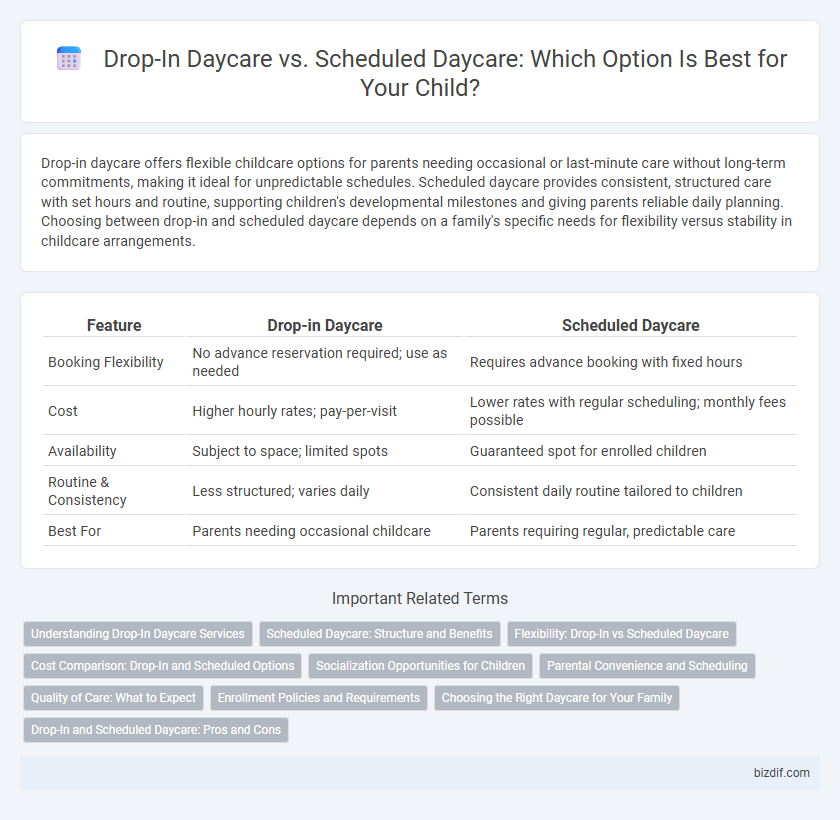Drop-in daycare offers flexible childcare options for parents needing occasional or last-minute care without long-term commitments, making it ideal for unpredictable schedules. Scheduled daycare provides consistent, structured care with set hours and routine, supporting children's developmental milestones and giving parents reliable daily planning. Choosing between drop-in and scheduled daycare depends on a family's specific needs for flexibility versus stability in childcare arrangements.
Table of Comparison
| Feature | Drop-in Daycare | Scheduled Daycare |
|---|---|---|
| Booking Flexibility | No advance reservation required; use as needed | Requires advance booking with fixed hours |
| Cost | Higher hourly rates; pay-per-visit | Lower rates with regular scheduling; monthly fees possible |
| Availability | Subject to space; limited spots | Guaranteed spot for enrolled children |
| Routine & Consistency | Less structured; varies daily | Consistent daily routine tailored to children |
| Best For | Parents needing occasional childcare | Parents requiring regular, predictable care |
Understanding Drop-In Daycare Services
Drop-in daycare services offer flexible childcare options by allowing parents to use care on an as-needed basis without prior reservations, making it ideal for irregular schedules or emergency situations. Unlike scheduled daycare, which requires consistent booking and often longer commitments, drop-in care provides instant access to qualified caregivers and age-appropriate activities, fostering convenience and adaptability. Understanding the benefits of drop-in daycare helps parents manage unpredictable work hours while ensuring children receive professional supervision and social interaction.
Scheduled Daycare: Structure and Benefits
Scheduled daycare provides a consistent routine tailored to a child's developmental milestones, promoting stability and emotional security. It facilitates personalized care plans and early education activities designed by trained caregivers, enhancing cognitive and social skills. Parents benefit from predictable hours, enabling reliable work schedules and peace of mind knowing their child is in a structured, nurturing environment.
Flexibility: Drop-In vs Scheduled Daycare
Drop-in daycare offers unmatched flexibility by allowing parents to bring children on an as-needed basis without prior booking, ideal for irregular work shifts or spontaneous plans. Scheduled daycare requires fixed enrollment with set hours, providing consistent routines but less adaptability for sudden changes. Families prioritizing convenience and variable schedules benefit most from drop-in services, while those seeking stability and predictable care may prefer scheduled daycare options.
Cost Comparison: Drop-In and Scheduled Options
Drop-in daycare typically incurs higher hourly rates compared to scheduled daycare, reflecting its flexibility and short-term availability. Scheduled daycare often offers discounted rates due to consistent attendance and longer-term commitments, making it more cost-effective for regular use. Families seeking occasional care may prefer drop-in options despite higher costs, while those requiring daily or weekly care benefit financially from scheduled plans.
Socialization Opportunities for Children
Drop-in daycare offers flexible socialization opportunities by allowing children to interact with diverse age groups and peer dynamics on varying days, enhancing adaptability and social skills. Scheduled daycare provides consistent social environments where children build stable friendships and develop collaborative routines, fostering emotional security and teamwork abilities. Both models support social development, but scheduled daycare promotes long-term relationship building while drop-in daycare encourages varied social experiences.
Parental Convenience and Scheduling
Drop-in daycare offers parents maximum flexibility by allowing them to drop off their children as needed without a fixed schedule, ideal for irregular work hours or spontaneous commitments. Scheduled daycare requires advance enrollment with set hours, providing a consistent routine that helps parents plan their daily activities efficiently. Parental convenience is maximized in drop-in options for unpredictable timetables, while scheduled daycare supports reliability and structured time management.
Quality of Care: What to Expect
Drop-in daycare typically offers flexible, short-term care but may have varied caregiver consistency, potentially affecting the continuity and personalization of attention children receive. Scheduled daycare centers generally provide structured programs with consistent caregivers, enhancing developmental support and emotional security for children. Quality of care in scheduled settings often includes routine activities, individualized learning plans, and regulated staff-to-child ratios, ensuring a stable and nurturing environment.
Enrollment Policies and Requirements
Drop-in daycare offers flexible enrollment policies with no long-term commitments, allowing parents to use services on an as-needed basis, often requiring minimal registration with updated immunization records and basic paperwork. Scheduled daycare requires formal enrollment with contracts specifying attendance days, payment terms, and sometimes waiting lists due to limited capacity, plus comprehensive documentation including health records, emergency contacts, and proof of residency. Both types prioritize child safety and compliance with state licensing regulations, but scheduled daycare typically enforces stricter requirements to ensure consistent care and resource planning.
Choosing the Right Daycare for Your Family
Drop-in daycare offers flexible, short-term care options ideal for parents with unpredictable schedules or occasional needs. Scheduled daycare provides consistent, long-term care promoting routine and stability, benefiting child development and family planning. Evaluating your family's lifestyle, budget, and child's needs ensures selecting the most suitable daycare type for optimal growth and convenience.
Drop-In and Scheduled Daycare: Pros and Cons
Drop-in daycare offers flexible, on-demand childcare without long-term commitments, making it ideal for parents with irregular schedules or occasional needs, but it may lack guaranteed availability and consistent caregivers. Scheduled daycare provides a structured routine with reserved spots and steady caregivers, promoting social development and stability for children, though it requires a fixed schedule that may not accommodate sudden changes. Weighing the convenience of drop-in services against the reliability and routine of scheduled daycare helps families choose the best fit based on their lifestyle and childcare priorities.
Drop-in daycare vs scheduled daycare Infographic

 bizdif.com
bizdif.com